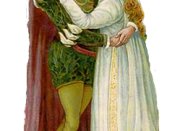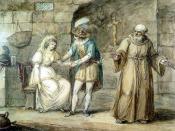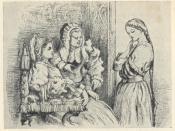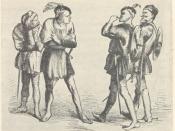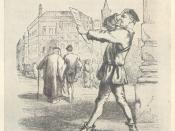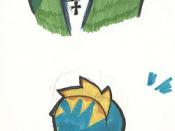First, another brawl breaks out between the servants of the feuding noble families of Capulet and Montague. Benvolio , a Montague, tries to stop the fighting, but is himself embroiled when the rash Capulet, Tybalt , arrives on the scene. After citizens outraged by the constant violence beat back the warring factions, Prince Escalus, the ruler of Verona, attempts to prevent any further conflicts between the families by threatning death for anyone who disturbs the peace in the future. "Once more on pain of death, all men depart." ( I. i. 149) Second, at the party, as Romeo watches Juliet, entranced, a young Capulet, Tybalt, recognizes him, and is enraged that a Montague would sneak into a Capulet feast. He prepares to attack, but Capulet holds him back. "Am I the master here or you? Go to!" (I. v. 79). Third, Benvolio and Mercutio encounter Tybalt , who, still enraged that Romeo attended Capulet's feast, has challenged Romeo to a duel.
Romeo, now Tybalt's kinsman by marriage, begs the Capulet to hold off the duel until he understands why Romeo does not want to fight. Angry with this plea for peace, Mercutio says that he will fight Tybalt himself. The two begin to duel. Romeo tries to stop them by leaping between the two. Tybalt stabs Mercutio under Romeo's arm, and Mercutio dies. Romeo, in a rage, kills Tybalt. The audience is sucked into the play during these times of action.
It is the poetry of the play, more than the plot, which transports the reader into the rich world of love. Sometimes blank verses blossom into rhymed lines, giving additional beauty to the words. Sometimes, Romeo and Juliet talk in sonnets to declare their love. Imagery is another aspect, which lifts the play to a higher level of intellectual pleasure. When Juliet appears on the balcony, Romeo, full of love and passion for her bursts into poetic exuberance. "But soft, what light through yonder window breaks..." In the tomb, Romeo again pours forth the passions of his heart in exquisite poetry. "Thou detestable maw, thou womb of Death, Gorged with the dearest morsel of the earth..." Shakespeare has obviously chosen the language for the play very carefully. The depth and beauty of the language is a true reflection of the depth and beauty of the characters themselves.
Shakespeare has enlivened the story with delightful characters and wonderful wit in order to lighten the bitterness of the tragedy .The opening scene of the play is filled with puns as the servants Sampson and Gregory indulge in a verbal duel as well as a fight with swords. Abraham observes that they will not carry coals, meaning that they would not put up with insults. Gregory replies that if they did, they would be "colliers...An we in choler, we will draw." Choler, meaning anger or hate, is pronounced almost exactly like "collier," but with a very different meaning. The Elizabethan audience enjoyed such puns. Mercutio's speech is always full of wit and humor. His wit is the product of his intellectual sharpness; his humor is a product of his poking fun at other people's weaknesses. On Romeo's love sickness, he says, "Alas, poor Romeo! He is already dead: stabbed with a white wench's black eye; shot through the ear with a love song." After being stabbed by Tybalt, Mercutio even speaks humorously from his deathbed, saying, "Ask for me tomorrow and you shall find me a grave man."
Shakespeare satisfies the many tastes of the audience through action, poetry, and humor. Together they make "Romeo and Juliet" an unforgettable and lyrical masterpiece, an undying love song.
